
A trolleybus is an electric bus that draws power from dual overhead wires using spring-loaded trolley poles. Two wires, and two trolley poles, are required to complete the electrical circuit. This differs from a tram or streetcar, which normally uses the track as the return path, needing only one wire and one pole. They are also distinct from other kinds of electric buses, which usually rely on batteries. Power is most commonly supplied as 600-volt direct current, but there are exceptions.
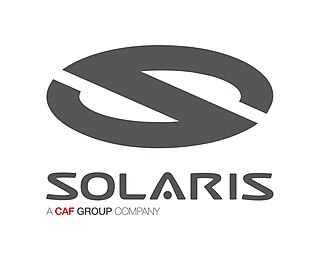
Solaris Bus & Coach sp z o.o. is a Polish manufacturer of public transport vehicles, with its headquarters in Bolechowo-Osiedle near Poznań. It is a subsidiary of Spanish rolling stock manufacturer CAF with a market share for electric buses in Europe of about 18%.

An articulated bus, also referred to as a slinky bus, bendy bus, tandem bus, vestibule bus, stretch bus, or an accordion bus, is an articulated vehicle, typically a motor bus or trolleybus, used in public transportation. It is usually a single-decker, and comprises two or more rigid sections linked by a pivoting joint (articulation) enclosed by protective bellows inside and outside and a cover plate on the floor. This allows a longer legal length than rigid-bodied buses, and hence a higher passenger capacity (94–120), while still allowing the bus to maneuver adequately.

Budapesti Közlekedési Zrt. or BKV Zrt. is the main public transport operator in Budapest, Hungary. BKV was established in 1968 as a unified public transport company with the merger of the companies responsible for the different means of transport; bus operator FAÜ, tram and trolleybus operator FVV, suburban railway operator BHÉV and riverboat operator FHV. The metro was added in 1973. The transport in Budapest underwent another reorganization in 2010 when the BKK was founded for the management of the city transport and infrastructure.

A dual-mode bus is a bus that can run independently on power from two different sources, typically electricity from overhead lines like a trolleybus or from batteries like a hybrid bus, alternated with conventional fossil fuel. In contrast to other hybrid buses, dual-mode buses can run forever exclusively on their electric power source (wires). Several of the examples listed below involve the use of dual-mode buses to travel through a tunnel on electric overhead power.
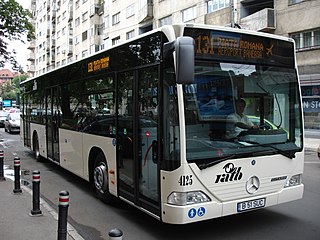
Societatea de Transport București is one of the main public transit operators in Bucharest, Romania, owned by the Municipality of Bucharest. From 1990 to 2018, the company had a different legal status and was known as the Regia Autonomă de Transport București (RATB).
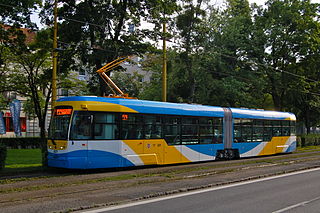
The Košice public transit system operates in Košice, Slovakia; services are managed by the Košice Transit Company.

GSP Belgrade is a public transit company in the city of Belgrade.

Dopravný podnik Bratislava, akciová spoločnosť is the only provider of city public transport in Bratislava. It provides 3 types of transportation:

A bi-articulated bus or double-articulated bus and sometimes train-bus, tram-bus, trackless tram or double bendy bus is a type of high-capacity articulated bus with an extra axle and a second articulation joint, as well as extended length. Bi-articulated buses tend to be employed in high-frequency core routes or bus rapid transit schemes rather than in conventional bus routes.
Rīgas Satiksme is a municipally-owned public transportation and infrastructure company serving Riga, Latvia and the surrounding areas. It was founded on 20 February 2003 as an umbrella organisation for the respective operators of trams, buses and trolleybuses in the city of Riga. Two years later, the separate operators of the different modes of public transport were merged and re-branded to its current name.

Chavdar was a Bulgarian bus builder located in the town of Botevgrad, Sofia Province. Founded by Racho Dzhambov in 1924, the company that would later become "Chavdar" produced around 200 buses between 1927 and 1947 on chassis from Ford Motor Company, Mercedes-Benz and Dodge. In 1948 the company was nationalised and acquired the name "Chavdar" in honour of the revolutionary Chavdar Voyvoda. It produced buses on chassis of Skoda 706 RTO but later shifted to license production of Setra and Steyr buses. It also developed several models on its own, which had good commercial success. The company closed in 1999.
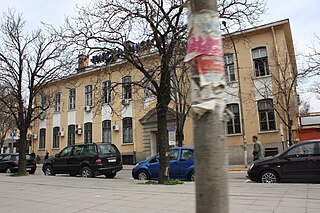
The Sofia Urban Mobility Center (SUMC) is the transit authority responsible for public transport in Sofia, the capital of Bulgaria. It is one of the municipal companies controlled by Stolichna Municipality.
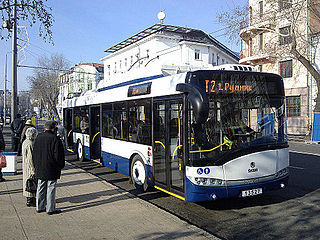
The Burgas trolleybus system forms part of the public transport network of the Black Sea city and municipality of Burgas, the fourth most populous city, and the largest and most important port, in Bulgaria.

RATBV S.A., formerly Regia Autonomă de Transport Brașov, and commonly referred to as RAT Brașov, is the only public transport operator in the city of Brașov, Romania. It is owned by the Brașov Municipality and it operates on a network of 43 routes inside Brașov, summing up to 664 km (413 mi), with a fleet of over 225 vehicles. It is also operating 19 routes within the Brașov metropolitan area.

The Stara Zagora trolleybus system forms part of the public transport network of Stara Zagora, Bulgaria.

Solaris Urbino 9 is a series of buses from the Solaris Urbino series, designed for public transport, produced by the Polish company Neoplan Polska, then Solaris Bus & Coach in Bolechowo near Poznań in Poland. Solaris Urbino 9 is the smallest vehicle from the Solaris Urbino family series.

Solaris Urbino 18 is a low-floor articulated version of the Solaris Urbino series buses designed for public transport, produced by the Polish company Solaris Bus & Coach from Bolechowo near Poznań in Poland. It is the second most popular Solaris model in terms of the number of units sold. Since 2005, the third generation of the Urbino 18 is produced. In addition to the basic model, which is powered by a diesel engine which meets the Euro V emission standard, there are versions produced to meet the EEV and fueled with CNG or the second generation hybrid bus model.
The VöV-Standard-Bus is a standard for transit buses in Germany based on requirements by the VöV Association of German Transport Companies. The first concept was named Standard-Linienbus which resulted in multiple variants of VöV-Buses. The first generation was conceived in 1968 being in production to the mid 1980s when it was replaced by the second generation Standard-Linienbus II being in production up to 2000.

Transport Călători Express (TCE) is a local government body responsible for the transport system in Ploiești, Romania.




















